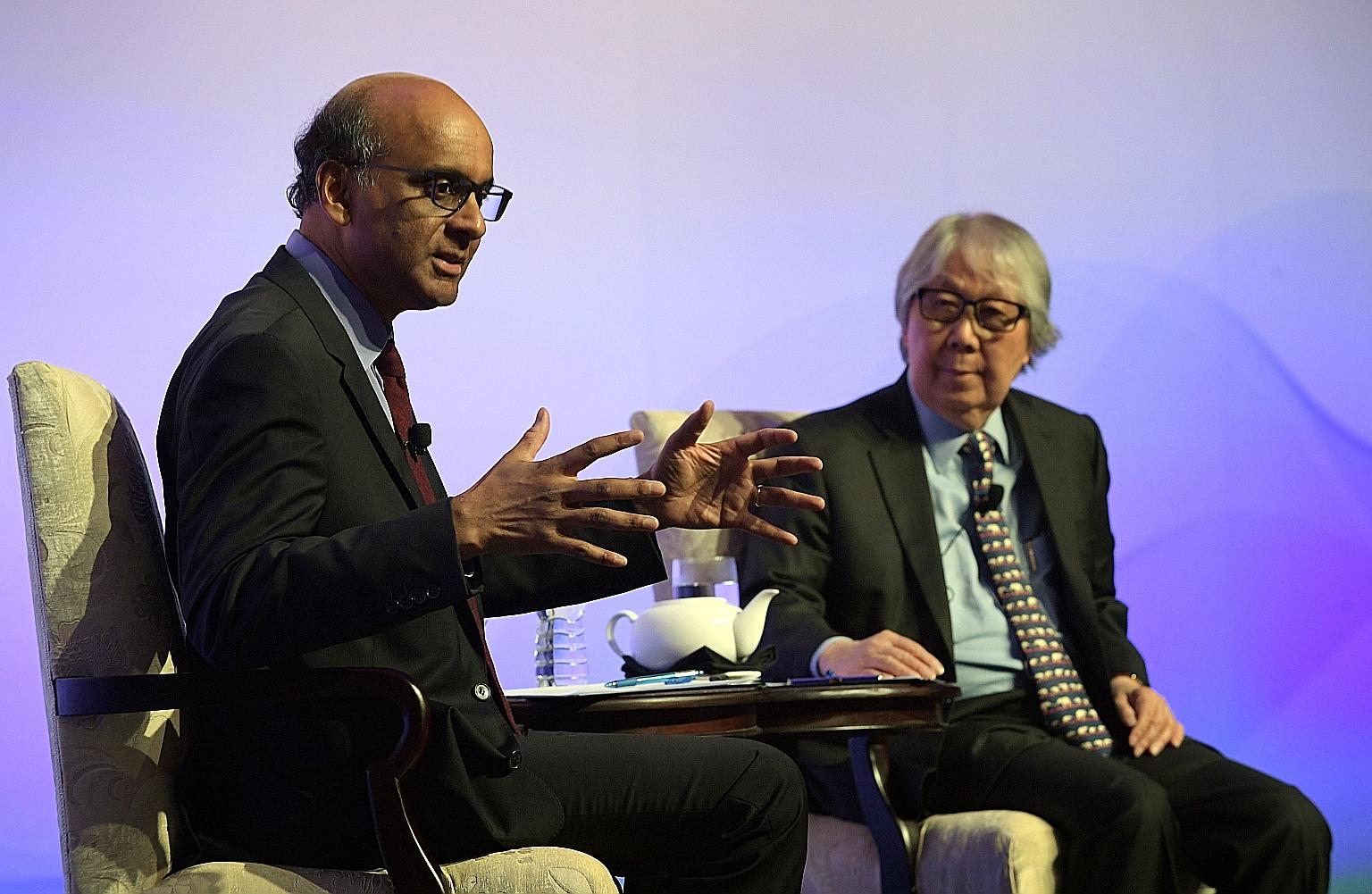To tackle inequality, ensure everyone is progressing: Tharman
Issue will become much sharper if society begins to stagnate, says Deputy PM
Sign up now: Get ST's newsletters delivered to your inbox

Deputy Prime Minister Tharman Shanmugaratnam at a dialogue last night moderated by Ambassador-at-large Tommy Koh at the Institute of Policy Studies' 30th anniversary dinner.
ST PHOTO: ALPHONSUS CHERN
Yasmine Yahya
Follow topic:
To tackle income inequality, Singapore first must ensure that everyone in society - including those in the middle class - continues to progress, said Deputy Prime Minister Tharman Shanmugaratnam.
Mr Tharman gave the analogy of being on an escalator, which has to keep moving so that everyone is better off.
"There is no point being better off than someone else if everyone is stuck in the same place," he said.
He noted that if the escalator breaks down and stops, there will be pervasive anxiety among many in society about "who is ahead of me and getting further away, and who is behind me and catching up with me".
Mr Tharman made this point during a dialogue on Thursday night (Oct 25) moderated by Ambassador-at-large Tommy Koh at the 30th anniversary dinner of the Institute of Policy Studies (IPS) at Marina Bay Sands.
Their discussion centred on the two topics that have dominated the national discourse in recent weeks - inequality and social mobility.
Mr Tharman said the key to tackling these issues is to ensure that everyone in society keeps doing better over time.
"Once you get stagnation in the middle of society over a long period of time, which is what happened in the United States and a range of other advanced economies, inequality becomes a much sharper and much more brittle issue, and the politics of inequality acquires a momentum of its own."
An escalator that continues to carry everyone upwards also makes it much easier for a country to have social mobility, he said.
"There are more opportunities, new skills to be learnt, new jobs to be obtained. It becomes much easier to achieve relative mobility when you have absolute mobility - what I get is not at the expense of someone else."
Mr Tharman also made the point that "a good part" of inequality in Singapore is generational, and a by-product of its success.
He noted that among Singaporeans who are now in their 50s, well over 60 per cent have no more than a secondary school education.
But in the past few decades, the Republic has transformed its education system and opened up a lot more opportunities for its younger generations.
As a result, older Singaporeans are now "at the lower end of the escalator", while subsequent generations have moved up.
"We have to focus our minds on how we can help older Singaporeans - not the true elderly but mature Singaporeans, who still have 40 years ahead of them - to work for as long as they wish, with dignity, earn a decent pay, with the support of their employers, the Government and the public," he said.
Safeguarding social mobility will also get more difficult as Singapore progresses because that is the nature of a meritocratic system, Mr Tharman noted.
"Those who succeed try to help their children and those who haven't succeeded find that the odds increase against them doing well in life," he said.
It means that Singapore has to work harder to keep mobility going, by intervening even in the neo-natal stage, before a child is born, and throughout his life, to ensure that he can do well for himself.
"It requires a consistent effort... investing in people at regular intervals and taking very seriously the idea that everyone can grow," Mr Tharman added.
Education Minister Ong Ye Kung made a similar point in a speech on Wednesday, when he said Singapore's meritocratic system has worked, but needs to evolve and move away from a narrow focus on past academic merit to recognise and celebrate a broader range of skills, talents and strengths.
In a speech on Oct 14, Prime Minister Lee Hsien Loong stressed the importance of ensuring that everyone in society, regardless of their family background, is brought to a good starting point.
When asked by IPS deputy director of research Gillian Koh for his assessment of how Singapore's progressive wage model (PWM) has helped low-wage workers, Mr Tharman said it has worked well, with the average wages of cleaners and security guards rising by at least 30 per cent over the past five years since it was introduced.
The PWM sets a wage floor for workers in the cleaning, security and landscaping sectors, and ties their wage increases to training.
While some have called for a universal minimum wage, Mr Tharman argued that this is not as effective as the targeted PWM, which directly benefits those workers who need it most.
In response to a point made by Prof Koh that society is becoming more stratified, Mr Tharman said Singaporeans are not as class-conscious as people in many other countries that he is familiar with, and that it should strive to maintain this attitude, and made a call for mixing across social classes.
In closing the dialogue, Prof Koh recited the lyrics to Bob Dylan's Workingman's Blues, a song about the plight of blue-collar workers.
Responding, Mr Tharman referred to a 1960s hit by British group The Hollies: "I can't resist adding - what should always be in our mind is, he ain't heavy, because he's my brother."

